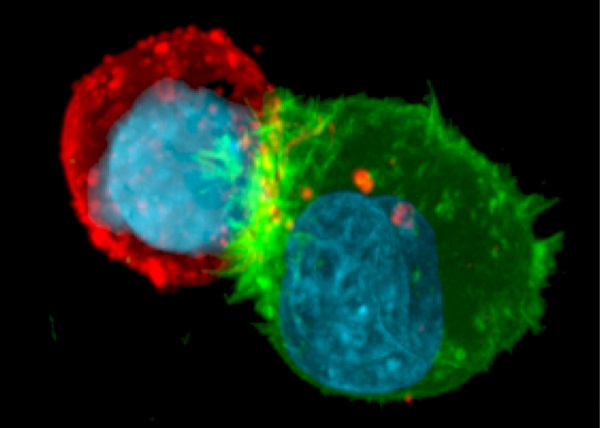 Credit: LIH
Credit: LIH
A team of researchers from the Luxembourg Institute of Health (LIH) has made a discovery about the defence strategies of breast cancer cells against the body's immune system.
Tumour cells can develop multiple strategies to protect themselves from the attacks of the immune system, which seeks to eliminate them. LIH researchers thus studied the defence strategies of breast cancer cells against so-called natural killer (NK) immune cells, discovering that some cancer cells are able to deploy a molecular shield that protects them from immune cells.
The NK cells, found in the immune system, can detect the abnormal characteristics of cancer cells by coming into contact with them and can release toxic substances to destroy them. In general, this attack kills cancer cells effectively and quickly. To ensure their survival and growth of the tumour, however, cancer cells are able to develop ingenious strategies to inhibit the immune system's reactions. These are the mechanisms that the team of Dr. Clément Thomas at LIH has tried to better understand to develop new therapeutic approaches for the treatment of cancer.
Dr. Clément Thomas and Dr. Antoun Al Absi, who led the laboratory experiments, commented on their findings: "Our research has shed light on a previously unknown fundamental process involved in the resistance of breast cancer cells. "We now need to understand how this shield allows cancer cells to stay unscathed. Current results indicate that remodeling of the cytoskeleton would result in a significant reduction in the amount of toxic proteins transmitted from NK cells to target cells."
The researchers hope to find a way to make this defence strategy "ineffective" and thus "improve the effectiveness of current immunotherapeutic therapies", according to Dr. Thomas. Indeed, these results open promising perspectives for the development of new therapeutic strategies in the treatment of breast cancer.
This research also forms an important part of Dr. Antoun Al Absi's doctoral thesis, supported by funding from the National Research Fund's (FNR) Research and Training Assistance Fund (AFR). The Cytoskeleton and Cancer Progression research team led by Dr. Clement Thomas is also supported by other grants from the FNR, the Cancer Foundation, F.R.S.-FNRS Télévie and Think Pink Lux.








